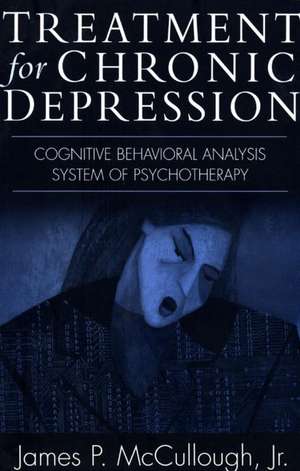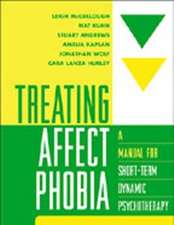Treatment for Chronic Depression: Cognitive Behavioral Analysis System of Psychotherapy (CBASP)
Autor Jr., James P. McCulloughen Limba Engleză Paperback – 30 oct 2003
This volume describes the Cognitive Behavioral Analysis System of Psychotherapy (CBASP), a research-based approach designed to motivate chronically depressed patients to change and to help them develop needed problem-solving and relationship skills. Presenting clear, step-by-step guidelines for implementing CBASP--along with compelling empirical evidence that supports its efficacy--the book is filled with illustrative case material that brings challenging clinical situations to life. Also covered are ways to measure treatment outcomes and recommended procedures for training and supervision.
Preț: 262.12 lei
Preț vechi: 275.92 lei
-5% Nou
Puncte Express: 393
Preț estimativ în valută:
50.16€ • 52.30$ • 41.69£
50.16€ • 52.30$ • 41.69£
Carte tipărită la comandă
Livrare economică 21 martie-04 aprilie
Preluare comenzi: 021 569.72.76
Specificații
ISBN-13: 9781572309654
ISBN-10: 1572309652
Pagini: 326
Ilustrații: Illustrations
Dimensiuni: 152 x 229 x 24 mm
Greutate: 0.54 kg
Ediția:Pbk.
Editura: Guilford Publications
Colecția Guilford Press
ISBN-10: 1572309652
Pagini: 326
Ilustrații: Illustrations
Dimensiuni: 152 x 229 x 24 mm
Greutate: 0.54 kg
Ediția:Pbk.
Editura: Guilford Publications
Colecția Guilford Press
Public țintă
Postgraduate, Professional, and Professional Practice & DevelopmentCuprins
I. CBASP and the Psychopathology of the Patient
1. A Therapist's Problems with a Chronically Depressed Patient
2. Introduction to Chronically Depressed Patients and the CBASP Program
3. Understanding the Psychopathology of Chronically Depressed Patients
4. Course Patterns, Comorbidity, and Psychological Characteristics
II. CBASP Method and Procedures
5. Strategies to Enhance Motivation for Change
6. Elicitation Phase of Situational Analysis
7. Remediation Phase of Situational Analysis
8. Using the Therapist-Patient Relationship to Modify Behavior
9. Measuring Acquisition Learning and Generalized Treatment Effects
III. History and Other Aspects of CBASP
10. CBASP Emergence on the National Scene
11. Training CBASP Psychotherapists
12. Comparison of CBASP to Beck's Cognitive Therapy and Klerman's Interpersonal Psychotherapy Models
13. Resolving Common Patient Problems and Crises
Appendix A: Therapist Prompts for Administering Situational Analysis (PASA)
Appendix B: Rating Scales for Adherence Monitoring and for Evaluating the Quality of the Interpersonal Relationship
Appendix C: Rating the Presence of Optimal CBASP Psychotherapist Qualities and Abilities
1. A Therapist's Problems with a Chronically Depressed Patient
2. Introduction to Chronically Depressed Patients and the CBASP Program
3. Understanding the Psychopathology of Chronically Depressed Patients
4. Course Patterns, Comorbidity, and Psychological Characteristics
II. CBASP Method and Procedures
5. Strategies to Enhance Motivation for Change
6. Elicitation Phase of Situational Analysis
7. Remediation Phase of Situational Analysis
8. Using the Therapist-Patient Relationship to Modify Behavior
9. Measuring Acquisition Learning and Generalized Treatment Effects
III. History and Other Aspects of CBASP
10. CBASP Emergence on the National Scene
11. Training CBASP Psychotherapists
12. Comparison of CBASP to Beck's Cognitive Therapy and Klerman's Interpersonal Psychotherapy Models
13. Resolving Common Patient Problems and Crises
Appendix A: Therapist Prompts for Administering Situational Analysis (PASA)
Appendix B: Rating Scales for Adherence Monitoring and for Evaluating the Quality of the Interpersonal Relationship
Appendix C: Rating the Presence of Optimal CBASP Psychotherapist Qualities and Abilities
Notă biografică
James P. McCullough, Jr., PhD, is a fellow of the American Psychological Association and was elected a Diplomate in Clinical Psychology by the American Board of Psychological Forensic Examiners. He is is Emeritus Professor of Psychology at Virginia Commonwealth University, where he served on the faculty for 45 years. An award-winning educator and researcher, Dr. McCullough's areas of special interest are dysthymia, double depression, and chronic major depression, particularly diagnostic criteria; unipolar diagnostic category psychosocial comparisons; and cognitive and single-case methodology evaluating both private practice and research.
Recenzii
Chronic depressions are often complex and not very responsive to standard approaches in cognitive and behavior therapy. The approach developed by Dr. James McCullough overcomes common barriers to effective psychotherapy by helping the chronically depressed patient become more specific and focused on achieving goals and improving interpersonal relationships. CBASP is an important and highly useful addition to our treatment regimens. --Michael E. Thase, MD, Department of Psychiatry, Western Psychiatric Institute & Clinic
CBASP--a distillation of 25 years of clinical and research work--is a practical, teachable, and now empirically tested time-limited psychotherapy for chronic depression. This volume will be a standard for training social workers, nurses, psychologists, psychiatrists, and counselors in how to treat this most disabling and difficult condition. Case vignettes bring the treatment principles to life, illustrating how to motivate patients, use the therapist-patient relationship, and evaluate how well patients are acquiring needed perceptual, behavioral, and cognitive skills. This is the first clearly articulated therapy specifically designed and tested with chronically depressed patients. A 'must read.' --A. John Rush, MD, Department of Psychiatry, University of Texas Southwestern Medical Center, Dallas, TX
McCullough has developed a unique and synthetic approach specifically geared to chronic depressions, distilled from years of research and practice with this challenging population. The approach brings together key aspects of interpersonal and cognitive-behavioral approaches within a structured short-term format that focuses on the functional implications of the depressed individual's behavior. As McCullough describes, the approach recently received strong empirical support in a large multi-site clinical trial. Rich in clinical detail and concrete examples, this volume will be useful for both experienced psychotherapists and trainees from all mental health disciplines who work with persons suffering from chronic depression. --Daniel N. Klein, PhD Professor of Psychology and Director of Clinical Training State University of New York at Stony Brook
James McCullough has devoted his career to treating chronic depression, a challenging syndrome that often drives patients and their therapists to despair. His CBASP approach, a practical amalgam of behavioral, cognitive, interpersonal and psychodynamic interventions, helps patients to master the social functioning they find so difficult. And it works! A major study has found CBASP to have efficacy equal to medication, and CBASP plus medication to work better than either alone. Clinicians who face the prevalent problem of chronic depression should read this impressive book --John C. Markowitz, MD, Associate Professor of Psychiatry, Cornell University Medical College; Author of Interpersonal Psychotherapy for Dysthymic Disorder
[A] very exciting book....Complicated problems cannot readily be resolved by simple solutions, and our currently available interventions, which are theoretically pure, may not have the conceptual and procedural breadth to provide what chronically depressed patients need. McCullough's approach does. It focuses on the depressed patient's problems in living and, while acknowledging the influence of biological factors, offers a creative integration of the contributions to our understanding of human behavior made by such seemingly diverse individuals as Sullivan, Piaget, and Skinner....McCullough has given us a clinically sound and empirically grounded approach to the treatment of chronic depression. --From the Foreword by Marvin R. Goldfried, PhD, State University of New York at Stony Brook
-CBASP--a distillation of 25 years of clinical and research work--is a practical, teachable, and now empirically tested time-limited psychotherapy for chronic depression. This volume will be a standard for training social workers, nurses, psychologists, psychiatrists, and counselors in how to treat this most disabling and difficult condition. Case vignettes bring the treatment principles to life, illustrating how to motivate patients, use the therapist-patient relationship, and evaluate how well patients are acquiring needed perceptual, behavioral, and cognitive skills. This is the first clearly articulated therapy specifically designed and tested with chronically depressed patients. A 'must read.' --A. John Rush, MD, Department of Psychiatry, University of Texas Southwestern Medical Center, Dallas, TX
McCullough has developed a unique and synthetic approach specifically geared to chronic depressions, distilled from years of research and practice with this challenging population. The approach brings together key aspects of interpersonal and cognitive-behavioral approaches within a structured short-term format that focuses on the functional implications of the depressed individual's behavior. As McCullough describes, the approach recently received strong empirical support in a large multi-site clinical trial. Rich in clinical detail and concrete examples, this volume will be useful for both experienced psychotherapists and trainees from all mental health disciplines who work with persons suffering from chronic depression. --Daniel N. Klein, PhD Professor of Psychology and Director of Clinical Training State University of New York at Stony Brook
James McCullough has devoted his career to treating chronic depression, a challenging syndrome that often drives patients and their therapists to despair. His CBASP approach, a practical amalgam of behavioral, cognitive, interpersonal and psychodynamic interventions, helps patients to master the social functioning they find so difficult. And it works! A major study has found CBASP to have efficacy equal to medication, and CBASP plus medication to work better than either alone. Clinicians who face the prevalent problem of chronic depression should read this impressive book --John C. Markowitz, MD, Associate Professor of Psychiatry, Cornell University Medical College; Author of Interpersonal Psychotherapy for Dysthymic Disorder
[A] very exciting book....Complicated problems cannot readily be resolved by simple solutions, and our currently available interventions, which are theoretically pure, may not have the conceptual and procedural breadth to provide what chronically depressed patients need. McCullough's approach does. It focuses on the depressed patient's problems in living and, while acknowledging the influence of biological factors, offers a creative integration of the contributions to our understanding of human behavior made by such seemingly diverse individuals as Sullivan, Piaget, and Skinner....McCullough has given us a clinically sound and empirically grounded approach to the treatment of chronic depression. --From the Foreword by Marvin R. Goldfried, PhD, State University of New York at Stony Brook
[This] book will become more than compulsory reading: it will become a keystone for advanced training in the psychotherapy of patients with chronic depression....For the researcher, McCullough demonstrates a clinically significant therapy approach for chronic depression that begs consideration of certification in this method....I recommend the book very strongly for the treatment of chronically depressed patients by therapists who have been in practice for 24 months to 24 years.
--Journal of Clinical Psychiatry, 8/29/2003ƒƒThe book is exciting because it presents a stimulating integrative theory of psychopathology and therapy and because it describes a complex and multifaceted treatment that has been shown to be effective in a large clinical trial....It is likely to be widely read by advanced graduate students, clinicians, and researchers interested in cognitive-behavioral and eclectic treatment. It should also be of great interest to dynamic therapists trying to help treatment-resistant patients.
--Contemporary Psychology, 8/29/2003Descriere
This volume describes the Cognitive Behavioral Analysis System of Psychotherapy (CBASP), a research-based approach designed to motivate chronically depressed patients to change and to help them develop needed problem-solving and relationship skills. Integrating elements of cognitive-behavioral and interpersonal therapy, this approach has been shown to be as effective as medication treatment in a recent 12-site national study with 681 chronically depressed outpatients. Even more significant, a combination of CBASP and pharmacotherapy produced a response rate of 85%--unprecedented for any large-scale randomized clinical trial of its kind--and demonstrated for the first time the superiority of combination treatment to either psychotherapy or pharmacotherapy alone. Filled with detailed case examples, the volume presents clear, step-by-step guidelines for using CBASP. Also discussed are ways to measure treatment outcomes; issues in research, training, and supervision; and managing common crises and problems in treatment.









